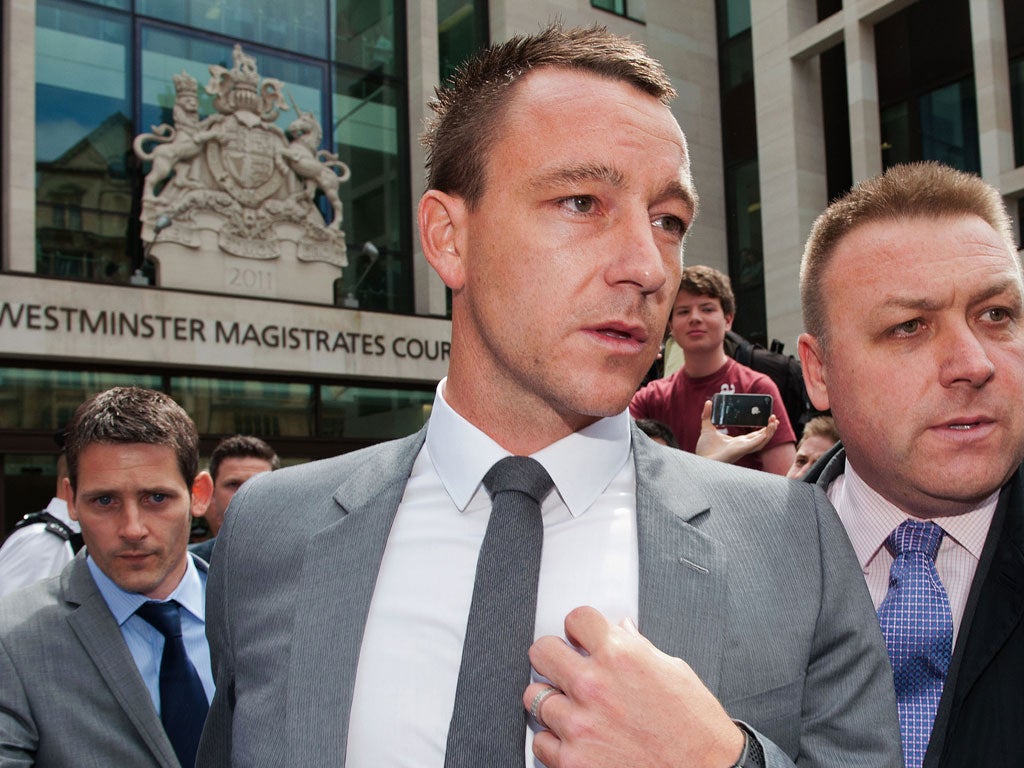John Terry requests personal hearing after FA bring charges over Anton Ferdinand incident

Your support helps us to tell the story
From reproductive rights to climate change to Big Tech, The Independent is on the ground when the story is developing. Whether it's investigating the financials of Elon Musk's pro-Trump PAC or producing our latest documentary, 'The A Word', which shines a light on the American women fighting for reproductive rights, we know how important it is to parse out the facts from the messaging.
At such a critical moment in US history, we need reporters on the ground. Your donation allows us to keep sending journalists to speak to both sides of the story.
The Independent is trusted by Americans across the entire political spectrum. And unlike many other quality news outlets, we choose not to lock Americans out of our reporting and analysis with paywalls. We believe quality journalism should be available to everyone, paid for by those who can afford it.
Your support makes all the difference.The former England captain John Terry set the stage today for another monumental disciplinary hearing for the Football Association when he requested a personal hearing to contest a charge by the governing body of having racially abused Anton Ferdinand.
The FA made the announcement to charge Terry just three hours before the Olympic opening ceremony of the London Games was due to begin, inviting criticism that the timing was a cynical attempt to bury a controversial decision. The governing body famously released the full judgement on Luis Suarez’s racial abuse charge last December on New Year’s Eve.
Within minutes of the announcement, Terry and Chelsea, who had been informed of the FA’s decision earlier in the day, released a statement in which they outlined their intention to contest the charges. Terry, 31, is currently with the Chelsea squad in Miami where they play Milan in a friendly tomorrow, the last game of their tour of America.
Terry was acquitted by Westminster magistrates’ court on 13 July of a racially aggravated public order offence after the district judge Howard Riddle ruled that the Chelsea captain could not be found guilty on the criminal standard of beyond reasonable doubt. The standard of proof on the FA charge is the civil standard of the balance of probability.
Terry is accused by the FA in relation to the incident at Loftus Road on 23 October last year in which he is alleged to have called Ferdinand a “f****** black c***”. At his trial last month he admitted to using the words but claimed that they were a sarcastic response to Ferdinand who, Terry claimed, had first accused him of using the term of abuse.
The FA has charged Terry with breaking rules E3(1) and E3(2) in his alleged abuse of Ferdinand, an identical charge to that which was laid against Suarez after his clash with Patrice Evra at Old Trafford eight days before the Ferdinand-Terry incident. The Liverpool striker was found guilty and given an eight-game ban and a £40,000 fine.
The exact charge against Terry for E3(1) is for using “abusive and/or insulting words and/or behaviour towards Queens Park Rangers’ Anton Ferdinand, contrary to FA rules” On the E3(2) charges the FA said: “It is further alleged that this included a reference to the ethnic origin and/or colour and/or race of Anton Ferdinand.”
Terry said today, in a statement on the Chelsea website: "I deny the charge and I will be requesting the opportunity to attend the commission for a personal hearing."
As with Suarez, Terry will face a four-man independent panel, three of whom will be drawn from FA lists which all clubs endorse annually. Chelsea will be told the identity of the individuals on the board and will be able to veto any of their involvement. The fourth member of the panel is likely to be an independent QC with expertise in this area of sports law.
The basic tariff for this kind of offence is a four-game ban. In Suarez’s case the commission decided that it was insufficient to reflect the severity of his offence, in which he repeatedly used the word “negro” in relation to Evra and raised the ban to eight games. Terry is alleged to have used the phrase “f****** black c***” just once, although there is no way of telling how the commission will judge its severity if he is found guilty.
The FA has never considered charging Ferdinand under E3(1) despite his admission in court that in the exchange with Terry on the pitch the Queens Park Rangers defender repeatedly called his opponent a “c***” and accused him of “shagging Bridgey’s missus” – a reference to Terry’s alleged extra-marital affair with the former partner of Wayne Bridge.
The FA believes that charging players for evidence they gave during an investigation would be such a disincentive to witnesses coming forward that running their disciplinary hearings would become impossible.
The FA investigation into Terry began last year but was halted when a complaint was made to the police by an off-duty police officer and it became a criminal investigation. Central to the case was an interview given by Terry to the FA disciplinary officer Jenni Kennedy, a former police officer, five days after the incident.
In the Terry case heard this month, the key witness for Terry was Ashley Cole who gave evidence which supported the theory that Ferdinand had first accused Terry of the racial slur. Terry’s counsel George Carter-Stephenson QC also successfully persuaded Riddle that despite video footage of the incident, there are, in Riddle’s words, “limitations to lip reading even by an expert.”
While Terry’s case at Westminster magistrates was played out in the full glare of public scrutiny, the FA commission hearing will be held in private.